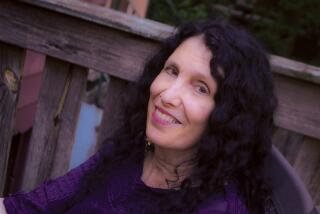‘Indignation’ by Philip Roth
|
|
ONE OF THE ways to recognize truly great writers is that even their mistakes engage us.
Philip Roth is our greatest living novelist, and his new book, “Indignation,” is an irritating, puzzling and fascinating bundle of mistakes, miscalculations and self-indulgences. (This being Roth in a slightly retrospective humor, there’s also a great deal of what used to be called self-abuse, actual and symbolic, but that’s another story.)
Readers familiar with Roth’s 28 previous books will recognize familiar territory, characters and preoccupations in “Indignation.” The year is 1951, and Marcus Messner is the brilliant but overprotected son of lower-middle-class Jewish parents in Newark, N.J. -- in this case, a second-generation kosher butcher and his wife. Marcus makes straight A’s at the local college, helps out in the store and, increasingly, chafes at a father whose overwhelming preoccupation with his gifted only child’s welfare and physical safety seems to be moving from the merely obsessive to the genuinely pathological.
Marcus, suffocating from his father’s emotional terror over the fragility and capriciousness of life, resolves to escape by transferring to a small Midwestern institution, Winesburg College in Ohio. (The literary allusion is intentional, but it’s hard to know what Roth intends by it, since Sherwood Anderson’s fictive city was a place of unexpected virtues; Messner’s is the outer circle of hell.)
Marcus has chosen his new school based on its sunny catalog; he even buys clothes that mimic those of the models in the brochure. What he finds there is unexpected -- Gentile, insufficiently appreciative of his striving and, worst of all, pious in that most goyische of ways, mandatory chapel too.
Fresh from the protective bosom of his tight-knit -- OK, claustrophobic -- Jewish family, he finds it impossible to fit in. He shatters the phonograph record, a Beethoven quartet, of one roommate who insists on playing music through the night, ends up in a fistfight with another roomie whose Protestant silences Marcus can’t bear. He works weekends in the local inn’s taproom, enduring imagined anti-Semitic insults and prissily disdaining the tobacco and beer others might find convivial because he neither smokes nor drinks alcohol.
This being a Roth novel, Marcus also falls hopelessly, obsessively into erotic thrall to the requisite inappropriate shiksa: “I had fallen in love with an ex-teenage drunk and inmate of a psychiatric sanitarium who’d failed at suicide with a razor blade, a daughter of divorced parents, and a Gentile to boot. I had fallen in love with -- or I had fallen in love with the folly of falling in love with -- the very girl my father must have been imagining me in bed with on that first night he’d locked me out of the house.”
Specter of Korean War
Marcus also has become obsessed -- indeed, he seems incapable of feeling anything in any other degree -- with the possibility he will fail in school, get drafted and die in Korea. (ROTC is one of his classes.) A reader quickly gathers that the fear isn’t entirely unreasonable, since on page 54, the narrator -- Marcus -- announces that he is, in fact, already dead. It’s one of this frustrating book’s several miscalculations. (One selects that noun consciously, as this conceit seems less a narrative device than it does a strategy.) It also lends a kind of dreary inevitability to Marcus’ “indignant” self-destructive course, the high point of which is the increasingly self-righteous protagonist’s extended confrontation with Winesburg’s dean, who summons him to discuss his problems adjusting to the school.
The two fence verbally over Marcus’ listing of his father’s occupation as “butcher” rather than kosher butcher and over his refusal to record his religion on his application. Marcus uses the opportunity to oppose mandatory chapel and religion in general, but instead of using his own -- Roth’s -- argument, he uses Bertrand Russell’s classic “Why I Am Not a Christian,” which, we’re told, the younger Marcus, a champion high school debater, had committed to memory. The basic problem with this confrontation, which one senses the author meant to be pivotal, is that between the younger man’s callow, self-righteous indignation and the dean’s priggishly smug, self-satisfied piety, there’s no side worth choosing.
In recent years, much of Roth’s best work has come when he sets the emotional specificity of his exquisitely drawn characters against the general backdrop of some large, recognizable historical event, as is the case in “I Married a Communist” and “The Plot Against America.” One suspects that the Korean War and a conventionally religious Midwestern college and town were chosen to frame this story because Roth had the war in Iraq and the influence of the religious right on his mind. Roth, in full-throated confrontation with our society’s treacly religiosity, would be something to read. Held at a distance, as it seems to be here, it’s the rhetorical equivalent of a drive-by shooting.
Descriptive writing
It’s all a bit of a shame, because there’s wonderful descriptive writing in “Indignation,” particularly when the author describes the Messner family’s kosher butcher shop:
“Though I was enrolled in a pre-law program, I did not really care about becoming a lawyer. I hardly knew what a lawyer did. I wanted to get A’s, get my sleep, and not fight with the father I loved, whose wielding of the long, razor-sharp knives and the hefty meat cleaver had made him my first fascinating hero as a little boy. I envisioned my father’s knives and cleavers whenever I read about the bayonet combat against the Chinese in Korea. I knew how murderously sharp sharp could be. And I knew what blood looked like, encrusted around the necks of the chickens, where they had been ritually slaughtered . . . the smell of blood was the first thing that would hit me whenever I visited my uncles and aunts in their stores. That smell of carcass after it’s slaughtered and before it’s been cooked would hit me every time. Then Abe, Muzzy’s son and heir apparent, was killed at Anzio, and Dave, Shecky’s son and heir apparent, was killed in the Battle of the Bulge, and the Messners who lived on were steeped in their blood.”
Misplaced center
It is that passage, quoted only in part here, that ought to have been the emotional center of Roth’s novel and the engine of a genuine indignation. Were the father’s fears really so exaggerated or the son’s anxieties really so neurotic, if he did indeed end up dead on a Korean hillside?
With a dead protagonist/narrator (an atheist to boot), there naturally arises a question about how “Indignation” and its author conceive the afterlife, which, in this novel, is a kind of hell in which the same life is relived eternally in obsessive detail. It’s not a bad conceit in and of itself, but the problem is that Roth has created such a self-involved protagonist in Messner -- even by Rothian standards -- that you rather think the silly twit would enjoy it.
More to Read
The biggest entertainment stories
Get our big stories about Hollywood, film, television, music, arts, culture and more right in your inbox as soon as they publish.
You may occasionally receive promotional content from the Los Angeles Times.






